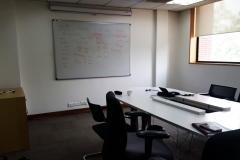About the A1 PROGRAM:
What You Will Achieve After Finishing the A1 Level:
1. You'll be able to understand and use familiar, everyday expressions and very simple sentences, which relate to the satisfying of concrete needs.
2. You'll be able to introduce yourself and others, as well as ask others about themselves such as where they live, who they know and what they own - and can respond to questions of this nature.
3. You can communicate in a simple manner if the person you are speaking to speaks slowly and clearly and is willing to help.
Programme Overview:
There are 12 modules that progressively build the student's understanding of the German language and ability to use it in real life situations.
This is achieved using a variety of day-to-day themes and situations (in a cafe or at the doctor's) where German is used to get something done.
Once the student comprehends the theme, it is followed by a grammar concept and its application. In this way, each unit introduces 3-4 grammar concepts, while also enriching the student's vocabulary.
Teaching Methodology:
A) Key Factor: Class Engagement
German can get overwhelming what with its multitude of grammar rules, seemingly never-ending exceptions, 3 genders, to name a few.
Hence, I use a light-handed approach, and link the lessons around the student's day to day life, so they can relax and participate more.
B) Application of Concepts
'All learning and no application makes Jack a dull boy.'
Said no one, and yet it is so true.
Wherever possible, I break away from the illustrations given in the textbook, and instead use something more local that draws students in and encourages them to apply a concept they just learned.
For example, if the lesson is on giving directions, I'd ask them to describe the way from their home to their office.
C) Dialogues & role-play
The batch size is optimum (3-5 students) to allow time for each student to participate in speaking role-plays and playing out dialogues, which are must to improve speaking skills.
D) Pronunciation
Even with the grammar and words perfectly in place, absolute confidence with speaking a foreign language remains a distant dream unless you unlock the key to the pronunciation.
And that's my goal: to make my students independent, to equip them with every single rule of pronunciation, including ALL possible exceptions, so that there will never be a word that would catch them by surprise.
This pronunciation guide has been proofed by native speakers and is perfectly reliable.
E) Short writing tasks
I give students simple writing tasks such as composing/ answering an e-mail, describing one's house or daily schedule.
F) Cultural insight
Learning a foreign language goes beyond mastering vocabulary, pronunciation and grammar. It's also about experiencing a new culture, one that is alien to us.
To this end, I draw forth from my personal experiences while traveling in German-speaking Europe to make the content relatable.
Learning material:
Going beyond the coursebooks and CD, I provide detailed notes on the learning modules covered that day along with online exercises to apply it.
Wherever possible, this is supplemented with handouts, illustrations, and vocabulary lists.
Location: Gurgaon Sector 56.
Fees: Rs. 15,000.
Sessions: 2 sessions per week, each lasting 2 hours
Batch-size: 6 students
Coursebook: Student would need to order this online and link would be shared after registration.
Programme Content:
Here's a summary of what the student will learn in each module:
Module 0 - Greetings, simple phrases, asking and answering questions, the alphabet and counting, personal pronouns and the verb 'SEIN'.
Module 1 - Getting to know people in a café and ordering drinks. Common verbs and how to use them.
Module 2 - Definite & indefinite articles, the 3 genders, negation, formation of the feminine noun and plural forms.
Module 3 - Pronunciation: vowels, consonants, dipthongs.
Module 4 - Talking about languages, countries, and nationalities. Specifying location with direction words. The Past Tense.
Module 5 - Describing an apartment. Talking about people. Possessive pronouns. Nominativ and Akkusativ cases. Adjectives.
Module 6 - How to ask for and mention time. Making appointments. Separable verbs. Negation of verbs and adjectives with 'nicht'. Prepositions of time.
Module 7 - Specifying where one works and how one reaches work. Navigating a building. Ordinal numbers. The Dativ case. Prepositions of location.
Module 8 - Talking about professions and work-related activities. Modal verbs.
Module 9 - Asking for the way, narrating a trip and writing postcards. Dativ and Akkusativ prepositions.
Module 10 - Talking about vacations and holidays. Describing an accident. The Present perfect tense for regular and irregular verbs.
Module 11 - Talking about shopping and food. Building the comparatives and superlatives.
Module 12 - Talking about clothes and weather. Adjective endings. Imperative form. Demonstrative pronouns. Akkusativ personal pronouns.













